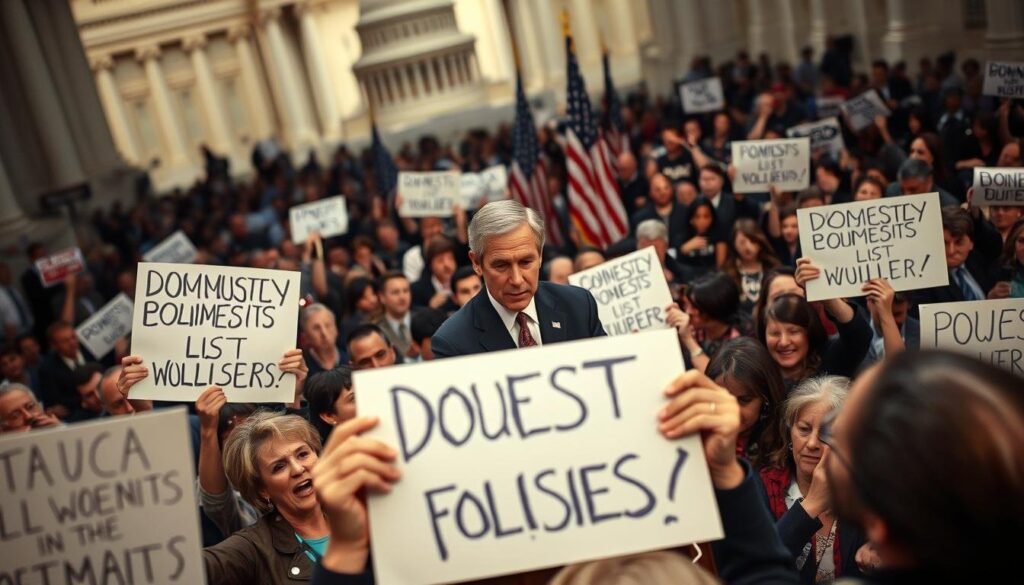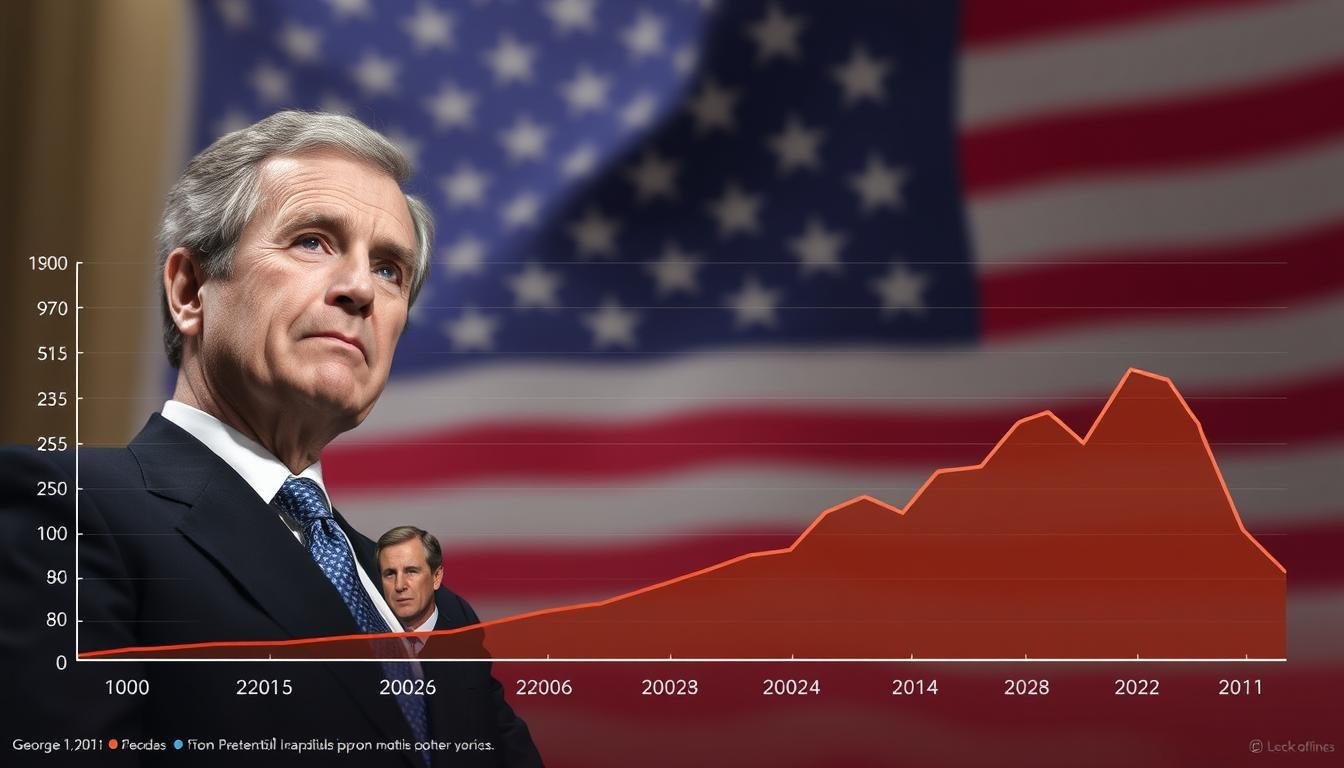Reasons Behind Bush’s Unpopularity: George W. Bush’s presidency was filled with significant events that shaped public opinion. The Bush administration faced many challenges that affected his presidential approval ratings.
Several factors led to his declining popularity. The way he handled certain key issues was widely criticized. This impacted his approval ratings.
Major events and decisions during his presidency greatly influenced public perception of George W. Bush. Knowing these factors helps us understand the complexities of his time in office.
Contents
- 1 The Bush Presidency: A Brief Overview
- 2 What Made Bush Unpopular as a President: Key Factors
- 3 The Iraq War and WMD Controversy
- 4 Domestic Policy Controversies
- 5 Hurricane Katrina and Crisis Management Failures
- 6 The 2008 Financial Crisis and Economic Legacy
- 7 Conclusion: Reasons Behind Bush’s Unpopularity
- 8 FAQ
- 8.1 What were the main reasons behind George W. Bush’s unpopularity as President?
- 8.2 How did the Iraq War affect George W. Bush’s approval ratings?
- 8.3 What role did Hurricane Katrina play in Bush’s unpopularity?
- 8.4 How did the 2008 Financial Crisis impact George W. Bush’s legacy?
- 8.5 What were some of the key domestic policy controversies during Bush’s presidency?
- 8.6 How did George W. Bush’s presidency come to be defined by his handling of foreign policy?
The Bush Presidency: A Brief Overview
The presidency of George W. Bush, from 2001 to 2009, was a time of big changes in America. You saw many important events that changed the country’s policies at home and abroad.
George W. Bush took office on January 20, 2001. He started with tax cuts to boost the economy. This move was seen as unfair by many, as it helped the rich more.
He also had to deal with the 9/11 attacks in 2001. This led to the War on Terror and the invasion of Iraq in 2003. These actions were very debated and are key parts of his legacy.
Bush also worked on domestic issues like education and healthcare. The No Child Left Behind Act and healthcare changes were part of his efforts. Knowing about these policies helps understand his presidency’s impact.
In short, George W. Bush’s presidency was marked by big events and decisions. These continue to shape American politics today.
What Made Bush Unpopular as a President: Key Factors
Looking at the Bush presidency, we see many reasons for his low popularity. His decisions on foreign and domestic issues greatly affected public opinion.
The Iraq War was a major factor. The debate over weapons of mass destruction (WMDs) hurt his ratings. The table below shows how public opinion changed after the invasion.
| Event | Approval Rating (%) | Disapproval Rating (%) |
|---|---|---|
| Pre-Invasion (2003) | 62 | 28 |
| Post-Invasion (2004) | 45 | 50 |
| Mid-term (2006) | 38 | 58 |
The table shows Bush’s ratings fell after key events. Hurricane Katrina in 2005 was another blow, with many criticizing the response.
Domestic issues like tax cuts and education reform also hurt his image. These policies were often seen as divisive, making politics more polarized.
In summary, Bush’s foreign and domestic policy decisions hurt his popularity. Understanding these factors helps us see the challenges of his presidency.
The Iraq War and WMD Controversy
Looking at why Bush’s approval ratings fell, the Iraq War and WMD controversy are key. The invasion of Iraq in 2003 was based on claims Saddam Hussein had WMDs. However, these claims were later questioned.
The Iraq War deeply affected American military personnel. It led to over 4,400 American service members losing their lives.
American Military Casualties
The war’s human cost went beyond just deaths. Many were wounded, some with severe physical and mental scars. The U.S. military faced significant strain, affecting morale and enlistment.
Economic Burden on American Taxpayers
The Iraq War also put a heavy economic burden on taxpayers. Estimated at over $2 trillion, it added to the national debt and took away from domestic spending.
The WMD controversy hurt public trust in Bush’s administration. The lack of finding WMDs in Iraq raised doubts about the war’s justification and the administration’s foreign policy.
In summary, the Iraq War and WMD controversy were major factors in public opinion turning against Bush. The war’s human and economic costs played a big role in his unpopularity.
Domestic Policy Controversies
Do you remember the heated debates over the Bush administration’s domestic policies? The Bush presidency was filled with controversy over healthcare, education, and the economy.
The Bush administration’s healthcare plan, Medicare Part D, was a big issue. It added prescription drug coverage to Medicare but was pricey. Critics said it helped drug companies more than taxpayers.
The No Child Left Behind Act was a big push for better schools. But, it was criticized for too much testing and not enough help for struggling schools. It was seen as too strict and lacking in support.
The Bush administration’s economic plans, like tax cuts and less regulation, were also debated. People argued about how these actions affected the national debt and the economy.

These controversies shaped how people saw the Bush administration. They show the challenges of solving the country’s problems. Understanding these issues helps us see the complexities of governance.
Hurricane Katrina and Crisis Management Failures
The Bush administration faced harsh criticism for its response to Hurricane Katrina. This disaster exposed the weaknesses in their crisis management plans. When the storm hit in 2005, the damage in New Orleans and nearby areas was severe. The government’s slow and ineffective response was widely panned.
Several factors led to the failure to prepare for and respond to the disaster. These included outdated infrastructure, poor communication among government agencies, and a lack of resources. The delays in deploying National Guard troops and providing aid made things worse for those trapped by the floods.
Key Failures in Crisis Management
- Inadequate preparation and infrastructure
- Poor inter-agency communication
- Insufficient resource allocation
| Aspect | Pre-Katrina | Post-Katrina |
|---|---|---|
| Infrastructure | Aging levee system | Significant upgrades and investments |
| Response Time | Slow deployment of aid | Improved emergency response protocols |
| Coordination | Poor inter-agency communication | Enhanced coordination mechanisms |
The aftermath of Hurricane Katrina led to major changes in disaster response policies. These changes focused on better infrastructure, improved communication among agencies, and quicker resource allocation. The Bush administration’s response to the crisis is seen as a key lesson in the need for effective crisis management.
The 2008 Financial Crisis and Economic Legacy
President Bush’s economic legacy is often tied to the 2008 Financial Crisis. This time was marked by job losses, home foreclosures, and a big drop in economic output.
The crisis had deep roots, including subprime lending and financial deregulation. The economic policies during Bush’s presidency, including tax cuts and deregulation, contributed to the economic conditions leading up to the crisis.
The crisis hit the global economy hard. The U.S. government’s response, like the Troubled Asset Relief Program (TARP), aimed to stabilize the financial system.
| Economic Indicator | Pre-Crisis (2007) | During Crisis (2008) |
|---|---|---|
| Unemployment Rate | 5% | 7.3% |
| GDP Growth Rate | 2.1% | -0.1% |
| Home Foreclosure Rate | 1.3% | 2.5% |
The 2008 Financial Crisis left a lasting mark on the U.S. economy and Bush’s legacy. It’s important to understand the crisis’s causes and effects to avoid similar problems in the future.
Conclusion: Reasons Behind Bush’s Unpopularity
George W. Bush’s presidency was filled with controversy and challenges. The Iraq War and WMD controversy were major issues. He also faced criticism for his handling of Hurricane Katrina.
The 2008 financial crisis added to his economic woes. It left a lasting mark on American politics and the global economy.
Reflecting on Bush’s legacy shows his presidency was a turning point in American history. It shaped the country’s politics and influenced future leaders.
His legacy is still debated by historians and policymakers. It serves as a key example of the challenges of leadership in crisis times.
See Also: Can a Sitting President Change the Constitution?
FAQ
What were the main reasons behind George W. Bush’s unpopularity as President?
George W. Bush’s unpopularity was mainly due to his handling of the Iraq War. The controversy over Weapons of Mass Destruction also played a big role. His domestic policies and how he managed crises, like Hurricane Katrina, were also criticized.
How did the Iraq War affect George W. Bush’s approval ratings?
The Iraq War hurt Bush’s approval ratings a lot. The rising number of American military deaths and the economic costs were big issues. The debate over whether there were Weapons of Mass Destruction added to the controversy.
What role did Hurricane Katrina play in Bush’s unpopularity?
Hurricane Katrina made Bush’s unpopularity worse. People felt he didn’t handle the crisis well. His slow response made things even harder for those affected.
How did the 2008 Financial Crisis impact George W. Bush’s legacy?
The 2008 Financial Crisis hurt Bush’s legacy a lot. His economic policies were seen as contributing to the crisis. His response to it was also seen as not good enough, which lowered his approval ratings even more.
What were some of the key domestic policy controversies during Bush’s presidency?
During Bush’s presidency, there were big debates over healthcare, education, and the economy. These debates led to a lot of criticism and hurt his popularity.
How did George W. Bush’s presidency come to be defined by his handling of foreign policy?
Bush’s presidency was shaped by his foreign policy decisions. The invasion of Iraq and how he managed the War on Terror were key. These actions had big implications for American foreign policy and global relations.

Hi, I am Tatum Bradford from Washington. I have a background in political science and work as a senior revenue officer. I love learning about U.S. presidents and sharing interesting facts about political history.

